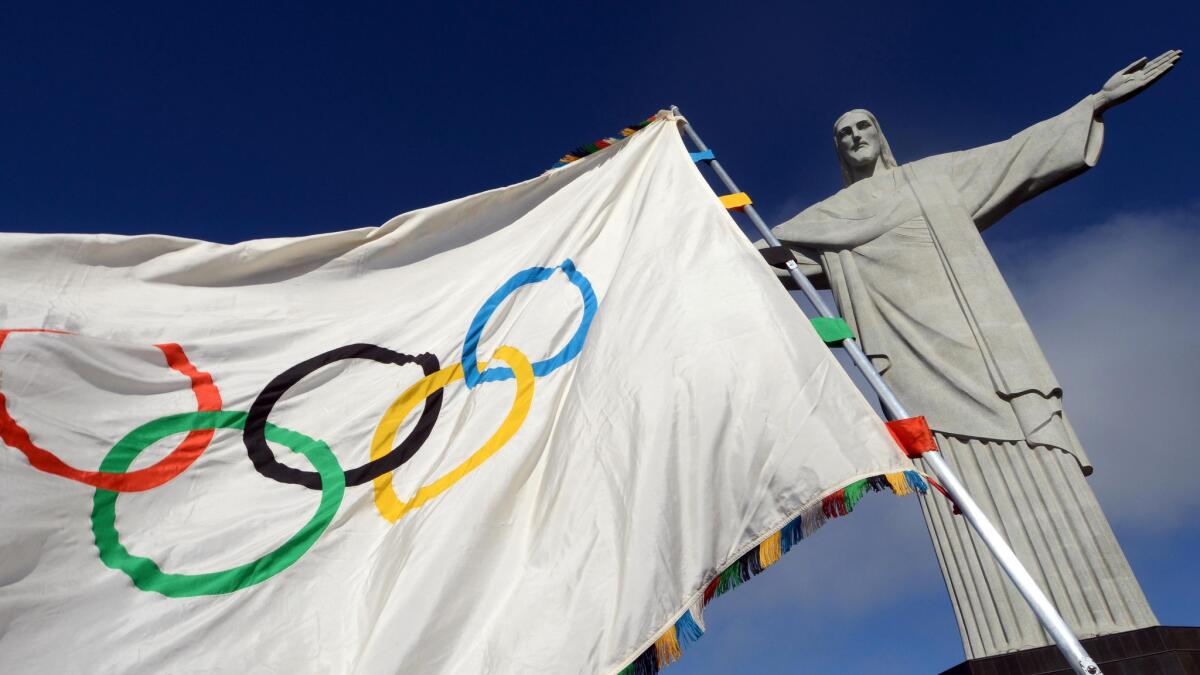Most Olympic athletes won’t be able to cash in on their glory

- Share via
When the Summer Olympics end Sunday, the clock starts ticking for medal winners hoping to cash in on their glory.
Other than established multimillionaire stars such as U.S. swimmer Michael Phelps and Jamaican sprinter Usain Bolt, the Olympians have a brief window of opportunity — most likely a few weeks — to sign potentially lucrative endorsement deals once the Games are over.
A handful might profit handsomely, notably gymnast Simone Biles, who arrived in Rio de Janeiro with endorsements already in hand and then captured the nation’s attention by winning four gold medals and one bronze.
But most medalists won’t get rich from their efforts because corporations looking for celebrity endorsers know that the athletes — and their Olympic sports held only once every four years — don’t maintain the attention paid to traditional sports such as football and baseball, experts said.
“Very few of them” will attain significant wealth from the Rio Games, said Ben Sturner, chief executive of Leverage Agency, a sports and entertainment marketing firm. “The news media will not be covering you three or four weeks from now.”
That’s especially true with the Summer Olympics, said Matt Delzell, managing director at the Marketing Arm, a sports marketing agency.
“The shelf life is so short for Summer Olympians because the timing is so bad,” he said. “We’re two weeks away from college football and the NFL, and the Major League Baseball playoffs are soon, so it’s a terrible time for the Olympic athletes to make hay in the spotlight.
“Most marketers know that Katie Ledecky’s name, come January, sadly is going to be a whole lot lesser known than it is now,” even though the swimmer captured four gold medals in Brazil, Delzell said.
It’s a moot point at the moment for Ledecky, who has opted to attend college and maintain her amateur status. But Biles — a three-time world champion — and others chose to turn professional, with Biles dropping plans to attend UCLA.
Biles, 19, had inked endorsement deals before the Olympics began, including a television commercial for Procter & Gamble Co.’s Tide detergent that ran during the games, and her net worth already tops $2 million, according to MoneyNation.com.
Biles and four other athletes also have been on the front and back covers of various Kellogg Co. cereal boxes since mid-June, extending the decades-old tradition of Olympic athletes being featured on cereal boxes.
But for most Olympians, “it’s just tough” to land sponsorship deals, not only because they’re no longer on television but also because they’re less likely to maintain the buzz on social media that advertisers now crave, said Matt Balvanz, vice president for analytics at Navigate Research.
“What are the social-media conversations about these athletes and how soon do they fall off? Two weeks out, no one will be talking about them,” Balvanz said.
None of the medal winners in Rio returns home empty handed, however. The United States Olympic Committee pays bonuses — $25,000 for each gold medal, $15,000 for silver and $10,000 for bronze — that can be accepted by amateur students such as Ledecky under NCAA rules.
Certain sports federations also pay bonuses to American medal winners. The USA Wrestling Foundation, for instance, is handing out a sizable $250,000 for gold medalists in Rio, along with $50,000 for silver and $25,000 for bronze.
The Olympic gold medals themselves, which are 85 millimeters in diameter and weigh 500 grams, are valued at about $564 apiece, based on the recent price of gold, according to Forbes.
That’s well below the record price of $708 for the 2012 Olympics in London, when gold and silver prices were higher.
Each gold medal, produced by the Mint of Brazil, actually is mostly made of silver and plated with six grams of gold. If the entire medal was made of gold, it would be valued at nearly $22,000.
That’s still small change compared with a multimillion-dollar shoe or apparel contract that a select few, such as Phelps, have been able to command.
But this year, “is anybody going to make seven-figure endorsements from these Olympics? I doubt it,” Delzell said.
Phelps reportedly has a net worth of $55 million, and Bolt’s reportedly tops $60 million, in good part because they’ve had long, superlative careers spanning more than one Olympics. That’s kept them relevant with consumers, analysts said.
Yet even if other athletes don’t hit the endorsement jackpot immediately after these Olympics, they can still build a career from their momentary brilliance at the Games, said Rob Prazmark, chief executive of 21 Sports & Entertainment Market Group.
Some Olympic athletes find ways to stay in the public’s eye — and thus relevant for endorsements from corporations — by appearing on TV shows, making public appearances or joining the broadcasting field.
“Dancing with the Stars,” for instance, has become a destination for former Olympians such as soccer player Hope Solo, figure skater Kristi Yamaguchi and speed skater Apolo Anton Ohno.
“Don’t measure it by how much money they make this year,” Prazmark said. “Their value as an Olympian doesn’t end after they win gold, it’s how they work their Olympic achievements. You don’t have to be Michael Phelps to make a career out of being an Olympian.”
For more business news, follow James Peltz on Twitter: @PeltzLATimes
ALSO
Sorry, Maya Dirado: You’ll still have to pay taxes on that Olympic medal
American women are dominating the Games, and it didn’t happen by accident
More to Read
Inside the business of entertainment
The Wide Shot brings you news, analysis and insights on everything from streaming wars to production — and what it all means for the future.
You may occasionally receive promotional content from the Los Angeles Times.











